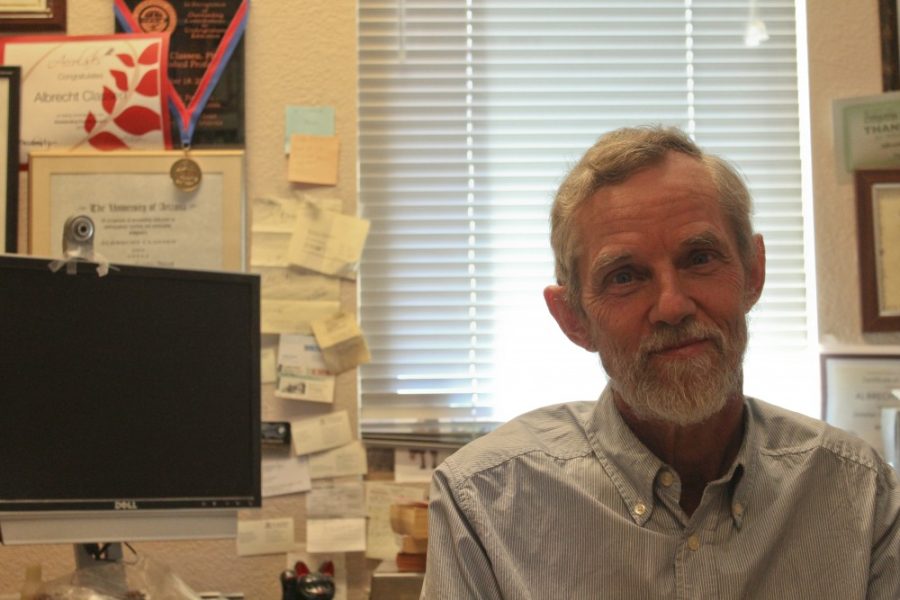Albrecht Classen almost cried when he learned he won the 2012 Professor of the Year award for the state of Arizona, but the German-born German Studies professor is no stranger to recognition for his work.
Awards line the walls of Classen’s office and help serve as a testament to the appreciation for his work and teaching ability. This week, Classen will receive three additional honors to add to the wall.
On Wednesday, Classen will be inducted as honorary member of the Golden Key International Honour Society. Later this week, he’ll also receive an award known as “Friend of German” from the American Association of Teachers of German.
The Friend of German award “recognizes outstanding support for and promotion of German and the study of German at the local, regional, or national level,” according to the association’s website.
Probably most significant is the fact that this week Classen will receive an award for U.S. Professor of the Year for 2012 in Arizona from the Carnegie Foundation for the Advancement of Teaching. When he found out he won, he said he felt moved.
The U.S. Professor of the Year award is for “the most outstanding undergraduate instructors in the country,” according to the main website.
Classen said he cannot attend the ceremonies to receive the awards because of lack of funding but that he also wants to be there for students in his classes and at the study abroad fair, where he will advertise his study abroad program.
“I cannot just quit my teaching,” Classen said. “As much as I would have loved to go there, my students really come first.”
Classen’s desire to serve students and enter the field of teaching hit him when he was about 14 years old. At that time, he was already passionate about literature and critical readings. When he was younger, he told himself, “It doesn’t matter what will happen later, I just need to do this.”
“If you’re passionate, you move mountains,” Classen added. “Everyone has some passion … just do it. But don’t do it 80 percent, do it 150 percent.”
Classen said his father was a high school teacher and that even after he retired, his students would still come to visit him, which pushed Classen to adopt a similar relationship with his students.
As an adviser to the department of German studies, Classen said he constantly sees students, but that there is never a line. He said students can visit him whenever they like.
“I try to give them a sense that they’re just welcome,” Classen said. “They’re not just numbers, they don’t have to stand in line … they can come whenever they need to see me.”
Classen’s colleagues who have seen his work with students haved commented on the strong relationships he establishes.
“I’ve noticed with students who come to the talks given by him, and from what I’ve heard of students who have been in his classes, that what they really appreciate is that they feel like they’re a part of something instead of just being lectured to,” said Chantelle Warner, an assistant professor of German studies.
Some of the students who work with Classen commented on his open-door policy and his interaction with students.
“He is amazing when it comes to interaction with students,” said Christina Butler, a master’s student in German studies and Classen’s mentee. “Even in his 300-level course he makes it a point to learn their names … which, I am floored by.”
Although he has his hands full as adviser to the German Student Club, adviser for the German Honors society and as a faculty fellow, to name a few, Classen’s biggest challenge is not too little free time but instead too little funding for all the activities he wants to do.
“It’s difficult in my field, we don’t have really easy access to grants,” Classen said. “My college doesn’t have that money. I want to do so many things … it holds me down.”
Despite the challenges he faces, Classen stressed his love for the department. He said it is a very congenial department and “maybe one of the best on campus.”
“I love my colleagues, they’re great,” Classen added. “We help each other, we understand each other. We have our own specialties, but we all believe in the same thing.”
Classen has taught at the university for 25 years and has been a visiting professor in Finland, Poland, South Korea, Germany, Italy and Spain, and has also traveled with students to a variety of locations.
When Classen talked about what it takes to become a professor, he cited the need for endurance and tolerance for rejection.
“You have to constantly take hits,” Classen said. “But it doesn’t matter how many hits you get, it matters how you take them. You need to have the ability and the interest and motivation to put in long hours. It doesn’t come easily.”









